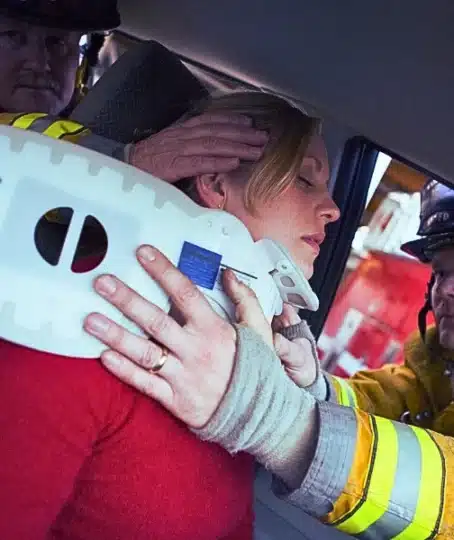
What Does Illinois Minimum Auto Insurance Cover After a Car Accident? In Illinois, drivers are mandated by law to maintain...


If you find yourself injured in a car accident while working in Illinois, it’s crucial to understand your on-the-job car accident rights and the necessary actions to take for adequate treatment and compensation. The Illinois car accident workers’ compensation laws aim to safeguard employees, allowing them to obtain compensation for injuries sustained in a work-related vehicle accident.
For legal support after your accident, contact Strong Law Offices at (309) 393-2928.

Work-related car accidents are common. Between 2011 and 2022, over 21,000 U.S. workers died in such crashes, accounting for 35% of all work-related fatalities. What you do after getting injured in a work-related accident is crucial. The right steps can strengthen your workers’ compensation claim.
If you have serious injuries, call emergency services for medical care. Even if your injuries seem minor, they could worsen over time, so it's important to see a medical professional. Getting treatment aids your recovery and gives you essential documentation for workers' comp or personal injury claims.
You should contact to law enforcement after a car accident. By contacting the police, you'll initiate the creation of a police report, which can support your claim. In Illinois, if the accident causes injuries or results in damages exceeding $1,500, you are required to report it to the police.
The police report will provide a thorough account of the accident, including its cause, the people involved, and statements from witnesses. When speaking with the officers, make sure to describe what happened as clearly and truthfully as you can, as this will help ensure your version matches the report. After the accident, if you need a copy of the police report, you can obtain it from your local police department by referencing the officer’s name and badge number.
At the accident scene, capture images of injuries, damage, and the entire scene. These photographs can act as valuable evidence to help establish what caused the accident and detail the extent of the damages involved.
Make sure to gather information from other drivers or parties involved in the accident. This should include their names, insurance details, driver's license numbers, and contact information such as phone numbers. Additionally, note the specifics of all vehicles involved, including their makes, models, and license plate numbers.
According to the Illinois Workers' Compensation Act, you must inform your employer about your injury. You can do this verbally or in writing, but providing a written notice is more effective since it serves as documented proof of your report. When you notify your employer, make sure to include details about the injury, as well as when and where it occurred. Generally, it's advised to report your injuries within 45 days following the incident.
Your employer must also file a workers’ compensation report with the Illinois Workers’ Compensation Commission. This report needs to include your personal details as well as specifics about the incident, such as the time and location of the accident, your activities at that moment, how the accident happened, and the injuries you incurred as a result.
In Illinois, workers’ compensation benefits are available for employees who get injured in work-related incidents. If you are wondering what types of injuries or illnesses are covered by workers' compensation, it covers injuries and illnesses related to your work. The Illinois Workers’ Compensation Act mandates that most employers carry insurance to safeguard their workers.
If you sustained injuries while driving for work, you might qualify for several types of workers’ comp benefits, including:
Under Illinois law, there's no need to establish fault to receive these benefits. However, because of this, you cannot seek additional damages from your employer.
A work-related car accident happens while you're acting within the scope and course of your employment. Instances that qualify include situations where you're driving a company vehicle or your own for work tasks, delivering items or moving goods, transitioning between different job sites, or heading to a required business meeting or conference. However, regular commuting to and from your workplace typically doesn't fall into this category, unless your employer supplies transportation or the travel is an essential component of your job duties.
A car accident lawyer in Illinois who knows how the amount of workers' compensation benefits is determined is vital for work-related car accident claims, guiding you through legal nuances and ensuring you get fair compensation while protecting your rights against insurers and employers. They know what a third-party claim in a Bloomington workers' compensation case is, and can manage both workers' compensation and third-party claims, gather necessary evidence, negotiate settlements, and represent you in court if needed. Lawyers analyze police reports, medical records, and witness statements to build a solid case and accurately assess both economic and non-economic damages, including future expenses and lost earning potential. Insurance companies often aim to reduce payouts, but a workers' compensation attorney can advocate for your interests and secure a reasonable settlement. For help with your work injury claims, contact us at Strong Law Offices.

What Does Illinois Minimum Auto Insurance Cover After a Car Accident? In Illinois, drivers are mandated by law to maintain...

What Is a Federal Safety Violation? A federal safety violation constitutes any action or inaction that contravenes rules and regulations...

Understanding Motorcycle Accidents and Helmet Laws Illinois is one of three states in the U.S. without helmet laws requiring motorcyclists...